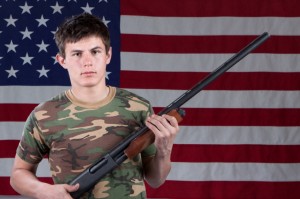 Americans who want to know what future gun control laws might look like should look north of the border. Canada’s gun control laws give us a good look at what future US gun control efforts look like.
Americans who want to know what future gun control laws might look like should look north of the border. Canada’s gun control laws give us a good look at what future US gun control efforts look like.
Even though Canadian gun control laws are stricter than those in the US, they’re just as inconsistent. The enforcement and implementation of Canadian gun laws is just as confusing and illogical as gun control legislation in the US. As in the US, gun control efforts in Canada are driven by emotion and often swing to extremes.
Canada’s Illogical Gun Laws
A prime example of this was the so-called long gun registry in which the Canadian government tried to gather data on every shotgun and rifle in the country. The law was illogical because the nation’s second most populous province didn’t participate in it. In an even more bizarre step, the government is set to eliminate the registry after collecting data on around six million guns.
The data apparently still exists but nobody is doing anything with it. Canadian cops cannot even access it in order to try and link guns to crimes even though taxpayers spent a lot of money to collect it. Since the data has not been eliminated, at some point in the future it could be used by Canadian police for a gun round up or crackdown.
The Canadian government had also required mandatory background checks for gun licensing. Yet that requirement was quietly weakened after Conservative Prime Minister Stephen Harper took office in 2011. Harper, who is from Alberta in Western Canada, is backed by Canada’s gun lobby. He had quietly promised gun rights activists that he would weaken laws and he did.
License checks are required in Canada, but they’re unevenly enforced. Quebec doesn’t register long guns at all, while Ontario, Canada’s largest province, is being accused of creating a gun registry as a first step to confiscation.
How to hide your guns, and other off grid caches…
The Canadian example gives a good indication of what post Newtown gun laws in the United States might look like. They’ll be completely illogical, unevenly enforced, and change with the political climate.
A Different Gun Culture
The political climate regarding guns in Canada is different from that in the United States. Only around 16% of Canadians own guns and most of those people are hunters who live in rural areas. There is no large well-organized group comparable to the National Rifle Association in Canada, nor is there a large grassroots gun rights movement.
Instead, there is strong support for gun rights in rural areas in Western Canada and Quebec, where guns and hunting are historically part of the culture. Most of the pro-gun arguments in Canada are based on preserving these rural traditions rather than freedom.
Stealth Gun Control
Another Canadian experience we’re likely to see in the United States is stealth gun control. Government officials and others sympathetic to gun control will simply ignore gun laws and quietly violate gun owners’ rights.
Solomon Freidman, an Ontario lawyer and gun-rights advocate, has alleged that Ontario officials are still collecting data for the long-gun registry even though the federal government abolished it. Freidman has told journalists that gun stores in the province have been ordered to maintain paper records listing gun owners’ names and addresses, even though federal law mandates their destruction.
Friedman also said that background checks which were supposed to be discontinued under federal law are continuing. His personal belief is that the province’s government is illegally keeping tabs on gun owners. Friedman told columnist Brian Lilley that he thinks Ontario authorities are keeping the information so they can round up the guns someday.
So Canadian gun owners still get whatever limited rights they have violated if they try to legally buy a gun. Officials don’t even follow the laws they don’t like. It is not hard to imagine cops keeping copies of gun registry data and using it to track down gun owners even though Parliament ordered it destroyed. It isn’t difficult to see gun control fanatics in the United States acting in the same way. We should be particularly concerned because most police officials are sympathetic to gun control.
That means any gun data collected by the US government in the future will exist forever. If a Democrat Congress creates a national gun registry and the Bureau of Alcohol Tobacco and Firearms gathers a huge amount of data on gun owners, that data will exist even if a future Republican Congress shuts down the registry and orders the data destroyed.
Canada currently has extensive stealth gun control efforts that are likely to be duplicated in the United States. If gun control fanatics cannot ban guns legally, they’ll do it off the books. Rumors that the Obama administration is buying up large amounts of ammunition to reduce the number of bullets available to the public could be the start of this.
So what does the Canadian Example Show us about Gun Control?
Basically what the Canadian example should teach us about gun control is this—gun control is completely illogical and totally based on emotion and politics. Gun-control fanatics, like any other fanatics, base their actions on fear and emotions, not logic.
Gun control laws are likely to be stiffer during times of intense emotion. Events like the Sandy Hook massacre will generate demands for stronger laws that grow silent as soon as the media cycle moves onto something else. Gun control fanatics will take advantage of emotions.
Worse, like other fanatics out to protect society from itself, gun-control supporters are willing to violate the law and trample the rights of citizens. Just as in Canada, some bureaucrats would feel entitled to enforce stricter gun-control laws even after they were abolished by duly elected legislative bodies.
Future US gun control efforts may well look like those in Canada, and they’ll be equally illogical, probably unenforceable, and totally based upon emotions. Such laws probably won’t keep guns out of the hands of criminals. Instead all they’ll do is create a confusing mess for law abiding citizens who want to own guns.
My eighty-year-old uncle in Northern Ontario had to fill out several confusing forms to buy ammo for his hunting rifle. The government then told him that those forms were a waste of time, but didn’t reimburse him for the time he wasted trying to comply with an idiotic law.
My guess is that the outcome of Canadian gun laws will be this… large numbers of Canadians who want to buy guns will purchase them illegally in the US and simply ignore the gun laws. The police will have a harder time keeping track of guns and the illegal gun trade will grow. The law will wind up making good people criminals as many average citizens will end up taking part in it.
If the US follows the Canadian example, the same thing will happen here. The efforts to protect the public through stricter laws will lead to more lawlessness and violence. Good people will acquire weapons for self-defense despite a government prohibition against them.
But in the end, our Constitution entitles the citizens of these United States the means to protect themselves and their families not just against lawlessness and violence, but against a government that would attempt to rule through thuggery and tyranny.
And perhaps that, more than anything, is the reason the government seeks to take our 2nd Amendment rights away from us.
 Off The Grid News Better Ideas For Off The Grid Living
Off The Grid News Better Ideas For Off The Grid Living




